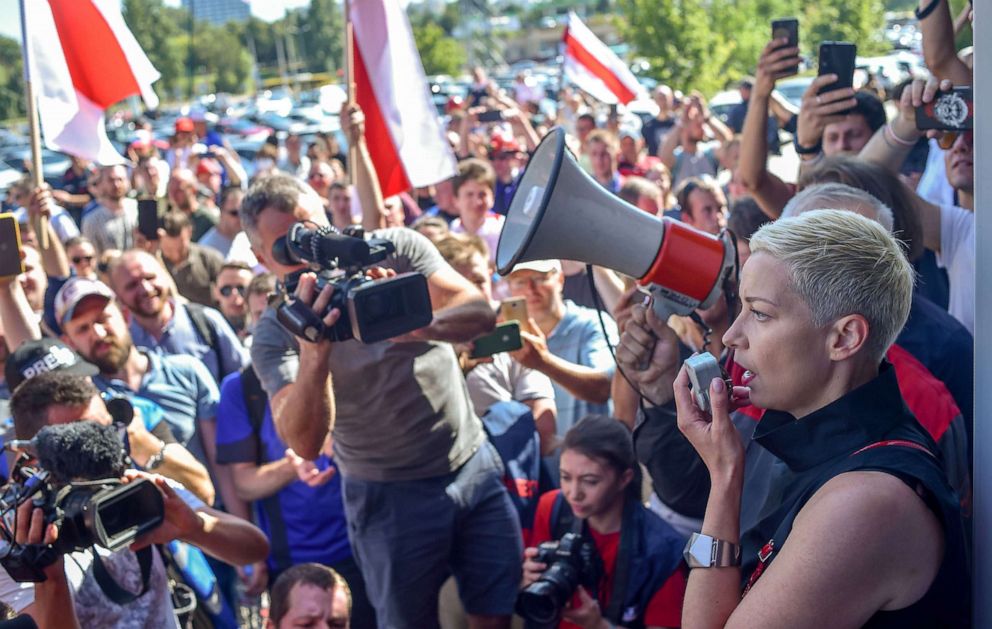Top Belarus opposition leader Maria Kolesnikova sentenced to 11 years
Maria Kolesnikova had refused to be forced out of Belarus even after kidnapping.
MOSCOW -- One of Belarus' top opposition figures, who helped lead massive protests against authoritarian leader Alexander Lukashenko last year, has been sentenced to 11 years in jail by a court in Minsk.
Maria Kolesnikova was one of three women who found themselves at the head of the huge peaceful protests that last summer threatened to end Lukashenko's 26-year rule but that have since been quashed with relentless repression.
Most leading opposition figures, including Svetlana Tikhanovskaya, who has become the movement's primary leader, were forced into exile shortly after the protests began last August, triggered by Lukashenko claiming victory in a presidential election widely condemned internationally as rigged.
But Kolesnikova refused to go into exile even as Lukashenko reasserted his grip. Last September, security forces abducted her off the streets in the capital Minsk and then drove her to the border with Ukraine, where they tried to forcibly deport her. But Kolesnikova resisted the attempt, tearing up her passport to make her deportation impossible and refusing to go, despite knowing she faced certain imprisonment in Belarus.
A Minsk court on Monday sentenced her to 11 years in prison, along with another prominent activist, Maxim Znak, after convicting them on charges of extremism and illegally trying to seize power.
He and Kolesnikova were members of the opposition's Coordination Council that was founded during the protests to demand a peaceful handover of power from Lukashenko.
Their trial was held behind closed doors with no evidence produced publicly and both had pleaded not guilty, denouncing the charges as political.

The sentences follow months of intense crackdown in Belarus as Lukashenko's regime has sought to smash any organized dissent after riding out the protests. Most independent media and human rights groups have been shut down and hundreds arrested with dozens already sentenced. Virtually all leading opposition figures are now jailed or in exile.
Western countries swiftly condemned Monday's verdict, with the United States and European Union demanding their immediate release.
Secretary of State Anthony Blinken slammed the sentences as "shameful" and based on "bogus" charges.
"We reiterate our call for an end to the campaign of repression against the people of Belarus for exercising their human rights inside and outside Belarus and for the immediate and unconditional release of all political prisoners -- including Ms. Kalesnikava and Mr. Znak," Blinken said in a statement.

Kolesnikova and a heart shape she forms with her hands became symbols of the protest movement. She and Tikhanovskaya were also seen as emblematic of the pivotal role women played in the protests that saw hundreds of thousands of people take to the streets. During the demonstrations, women holding flowers and dressed in red and white -- the colors of the protests -- often formed peaceful human chains, early on forcing riot police to back down.
Video from court on Monday showed Kolesnikova smiling and making the trademark heart shape with her hands in handcuffs while standing in a glass cage.
Kolesnikova had been a professional flute player before getting involved in politics for the first time last year when she became the spokesperson for Viktor Babriko, an energy executive who tried to run against Lukashenko in the election.
After Babriko was jailed before the vote on fraud charges widely criticized as political, she linked up with Tikhanovskaya, who herself had stepped in to replace her own husband as a candidate who was also imprisoned.
"Maria & Maksim are the heroes for Belarusians," Tikhanovskaya wrote on Twitter following the verdicts.
"The regime wants us to see them crushed & exhausted," she wrote, noting the video showing Kolesnikova and Znak smiling instead. "But look - they are smiling & dancing. They know - we will release them much earlier than these 11 years. Their terms shouldn't frighten us -- Maksim and Maria wouldn't want this."



